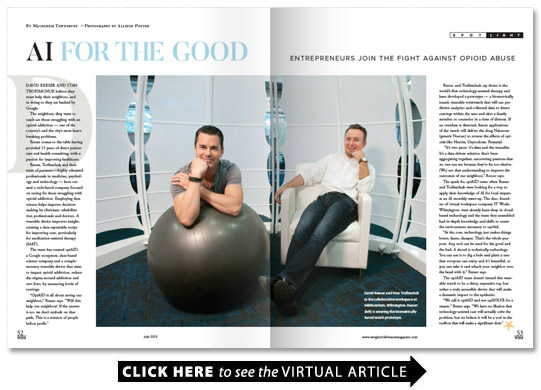AI for the Good
BY Mackenzie Tewksbury
Entrepreneurs join the fight against opioid abuse
David Reeser and Stan Trofimchuk believe they must help their neighbors and in doing so they are backed by Google.
The neighbors they want to reach are those struggling with an opioid addiction — one of the country’s and the city’s most heartbreaking problems.
Reeser comes to the table having provided 15 years of direct patient care and health consulting with a passion for improving healthcare.
Reeser Trofimchuk and their team of partners –highly educated professionals in medicine psychology and technology — have created a tech-based company focused on caring for those struggling with opioid addiction. Employing data science helps improve decision-making by clinicians rehabilitation professionals and doctors. A wearable device improves insight creating a data-repeatable recipe for improving care particularly for medication-assisted therapy (MAT).
The team has created opiAID a Google ecosystem data-based science company and a complementary wearable device that aims to impact opioid addiction reduce the stigma around addiction and save lives by measuring levels of cravings.
“OpiAID is all about saving our neighbors ” Reeser says. “Will this help our neighbors? If the answer is no we don’t embark on that path. This is a mission of people before profit.”
Reeser and Trofimchuk say theirs is the world’s first technology-assisted therapy and have developed a prototype — a biometrically tuned wearable wristwatch that will use predictive analytics and collected data to detect cravings within the user and alert a family member or counselor in a time of distress. If an overdose is detected future applications of the watch will deliver the drug Naloxone (generic Narcan) to reverse the effects of opioids like Heroin Oxycodone Fentanyl.
“It’s two parts: it’s data and the wearable. It’s a data-driven solution that’s been aggregating together uncovering patterns that no one can see because they’re far too elusive. (We) use that understanding to improve the outcomes of our neighbors ” Reeser says.
The spark for opiAID came when Reeser and Trofimchuk were looking for a way to apply their knowledge of AI for local impact at an AI monthly meet-up. The duo founders of virtual workspace company IT Works Wilmington were already knee-deep in cloud-based technology and the team they assembled had in-depth knowledge and skills to create the environment necessary to opiAid.
“At the core technology just makes things better faster cheaper. That’s the whole purpose. Any tool can be used for the good and the bad. A shovel is technically technology. You can use it to dig a hole and plant a tree that everyone can enjoy and it’s beautiful or you can take it and whack your neighbor over the head with it ” Reeser says.
The opiAID team doesn’t intend this wearable watch to be a shiny expensive toy but rather a truly accessible device that will make a dramatic impact to the epidemic.
“We call it opiAID and not opiSOLVE for a reason ” Reeser says. “We have no illusion that technology-assisted care will actually solve the problem but we believe it will be a tool in the toolbox that will make a significant dent.”
